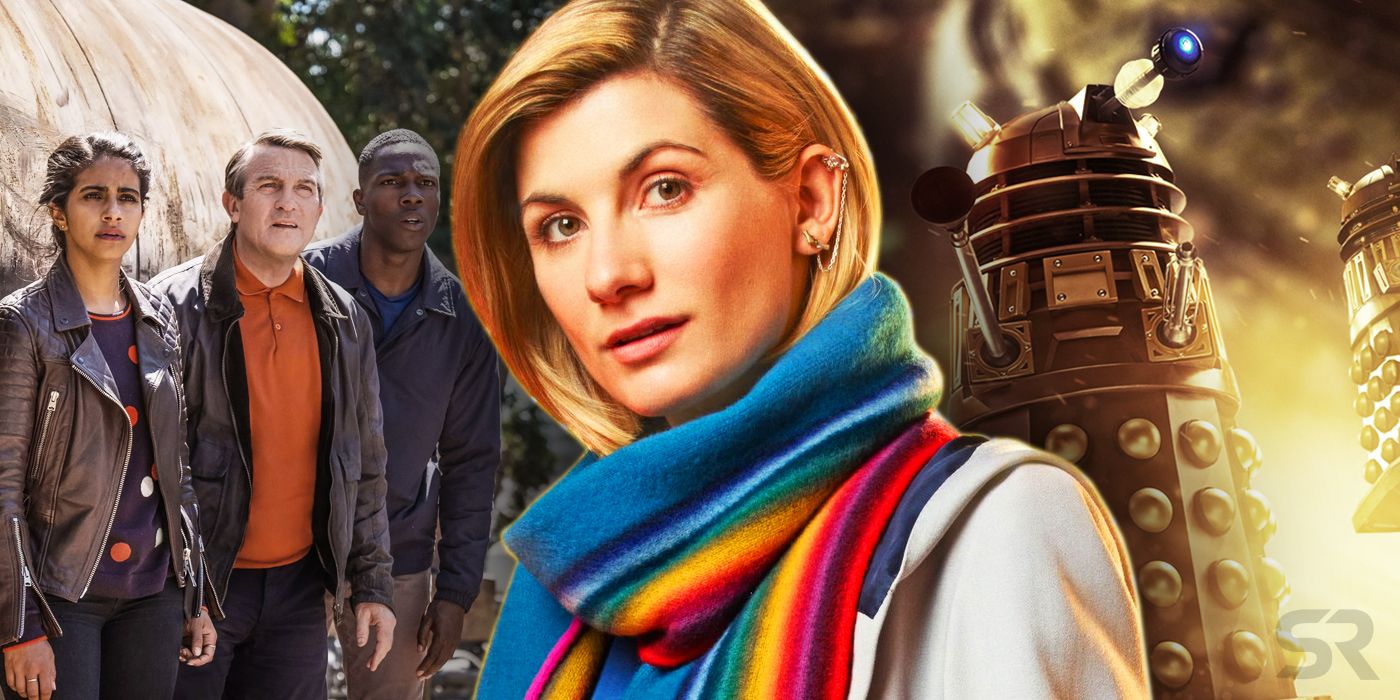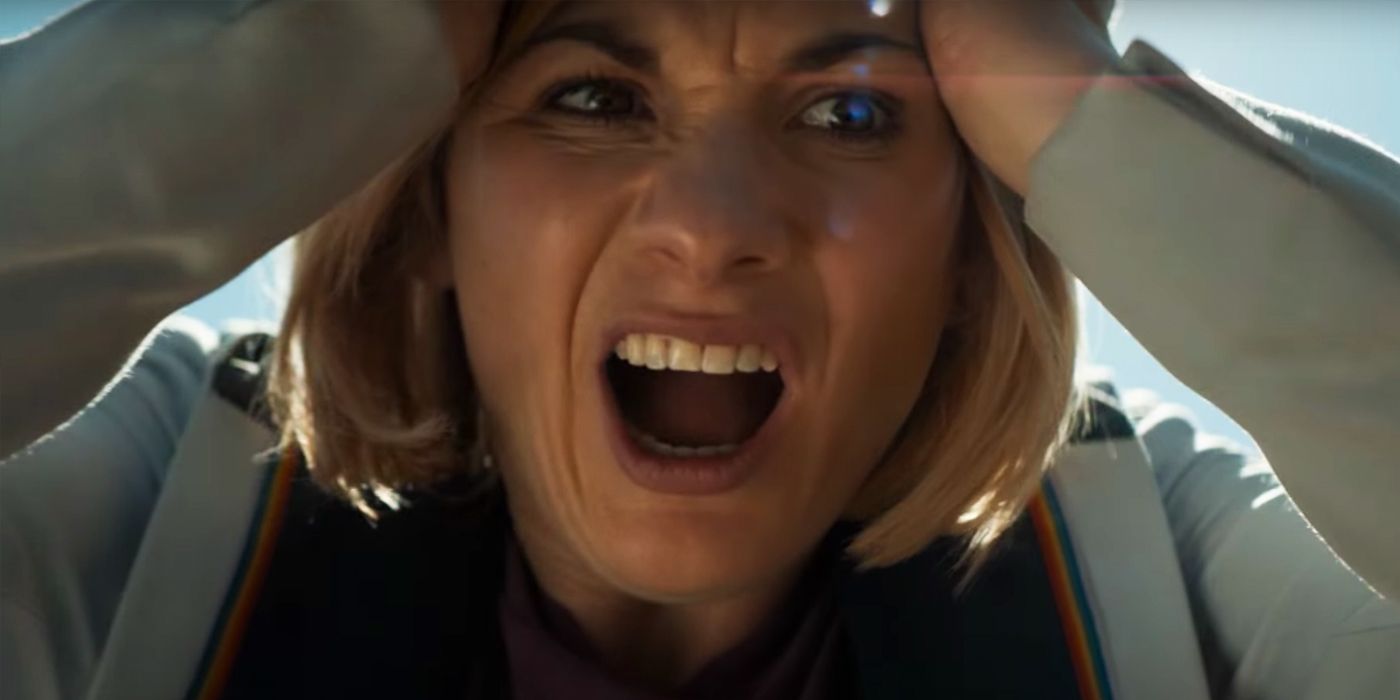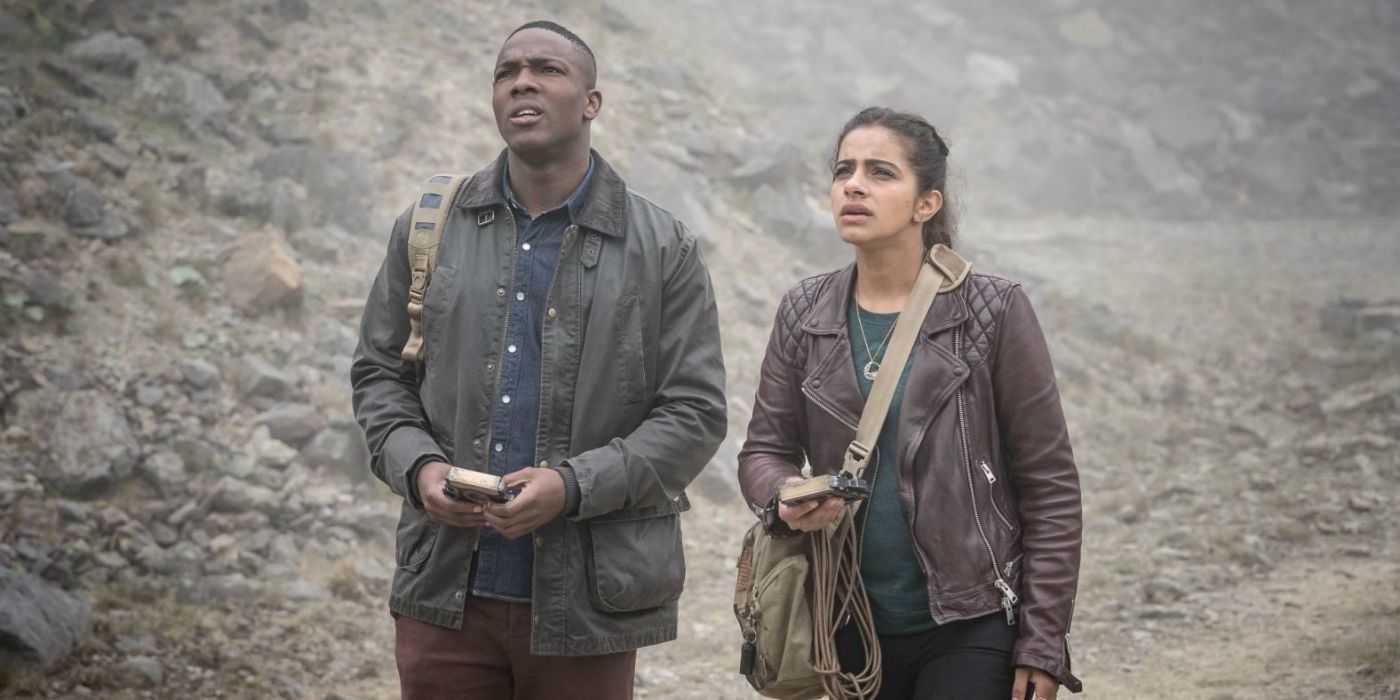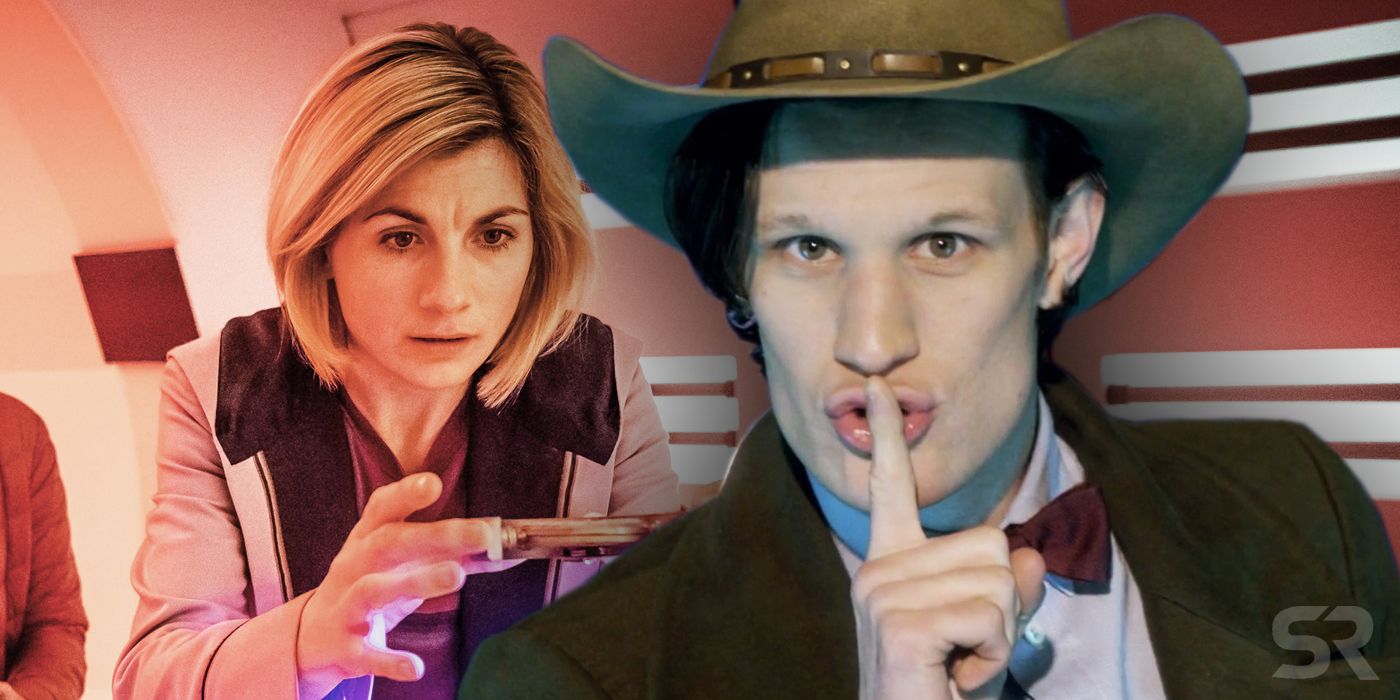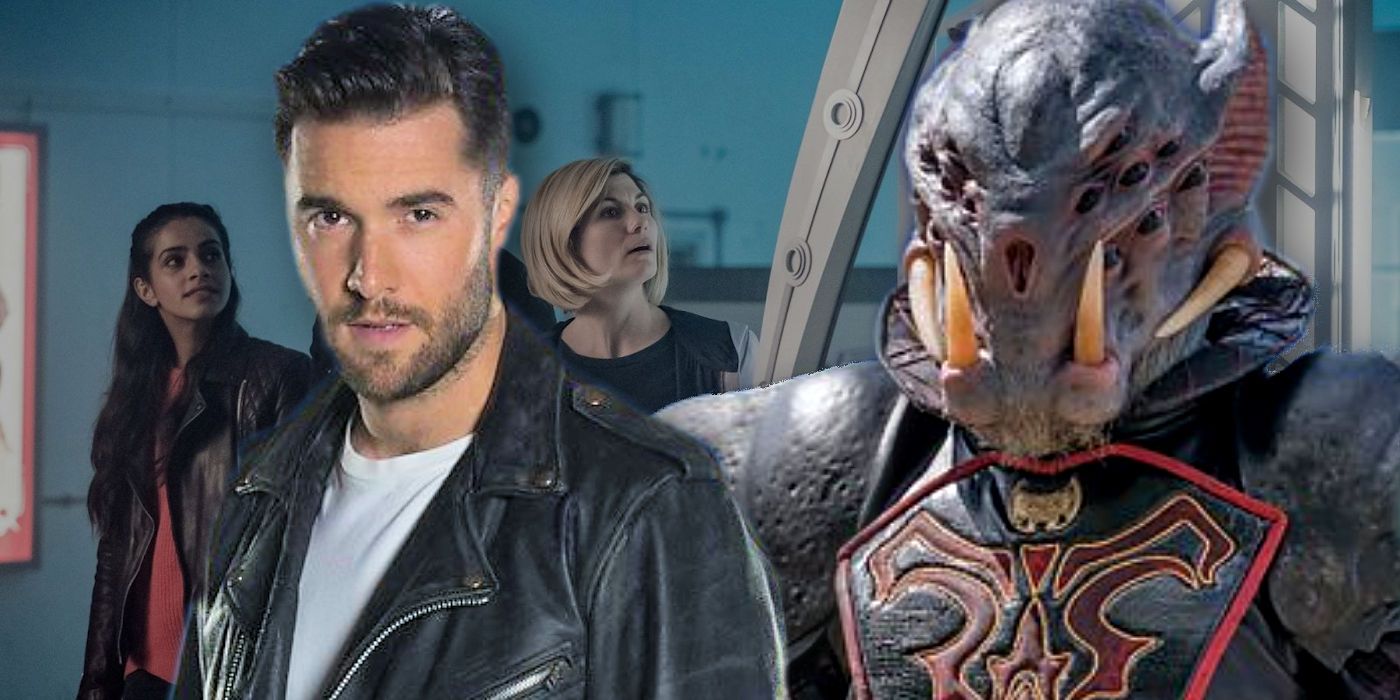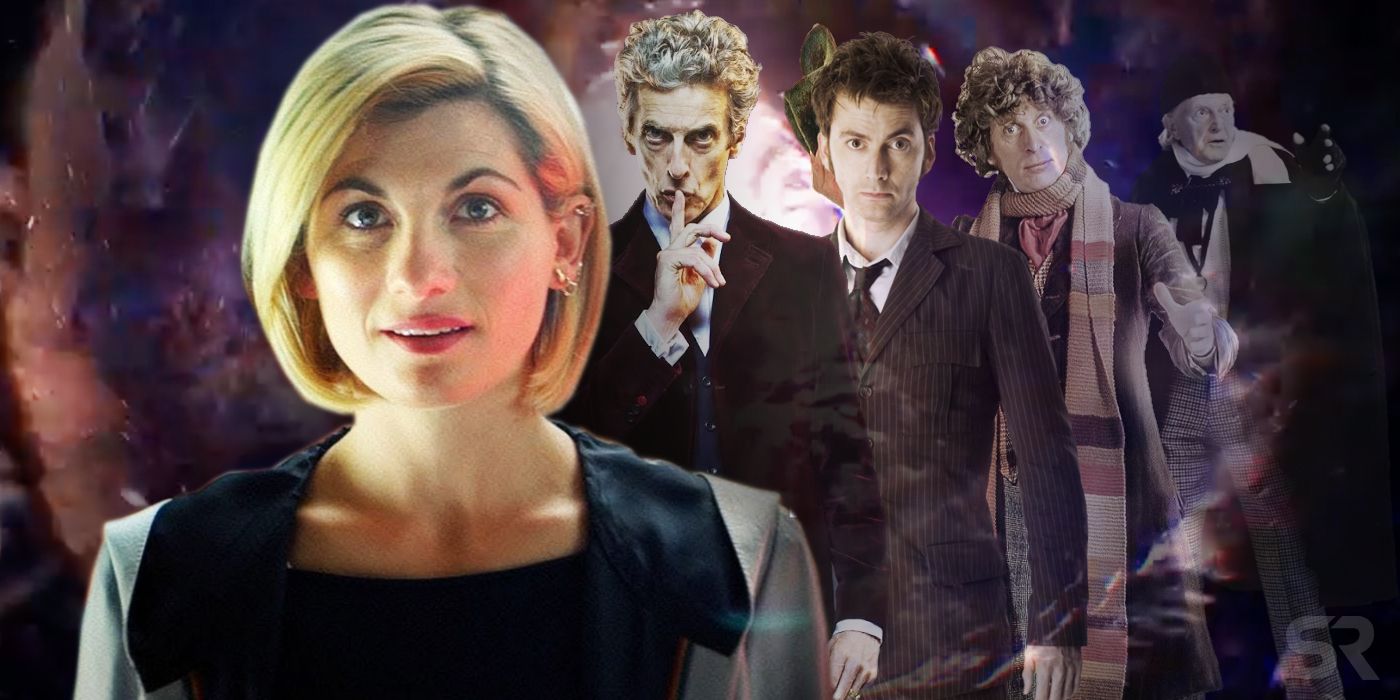Doctor Who season 11 has divided the online fan community. Change has always been hard-baked into Doctor Who; every regeneration is basically an opportunity for the series to reinvent itself from the ground up, and since 2005 regenerations have often coincided with a new showrunner, with a drastically different vision for the series. That's certainly been the case with Doctor Who season 11, which saw Jodie Whittaker take over as the Thirteenth Doctor at the same time Chris Chibnall took charge.
This time around, the debate seems more extreme than ever before. In part that's simply a reflection of the growing power of social media, which allows everybody to air their voice. But it's also because both British and American society is currently going through something of a cultural crisis, with the internet serving as the battleground between different groups with competing visions of what it means to be British (or, some political commentators would argue, English) and American.
Related: Doctor Who: Why Jodie Whittaker Is Already A Great Doctor
Doctor Who season 11 is daring to contribute to that conversation, with the changes being made by Chibnall involving the series choosing a side in this cultural conflict. Given this is the case, it should come as no surprise that season 11 has proved unusually divisive. Here, we're going to focus in on some of the specific changes that have been made in Doctor Who season 11, and examine just why they've been so controversial.
- This Page: The Doctor and Her Friends
- Page 2: Doctor Who Swaps Continuity For Social Justice
- Page 3: Season 11 Is A Different Sort Of Doctor Who
Jodie Whittaker - The First Female Doctor
The casting of Jodie Whittaker as the Thirteenth Doctor sent shockwaves through the online fan communities. There's nothing new about the idea of a female Doctor; it's been doing the rounds since 1981, when Tom Baker decided to crack a joke about it when announcing his departure from the series. Into the 2000s, the relaunch of Doctor Who led to enormous pressure for the BBC to choose a woman for the role. Steven Moffat found himself on the defensive, insisting that he simply got obsessed with the idea of seeing Peter Capaldi in the TARDIS. "This isn’t a show exclusively for progressive liberals," he argued. "This is also for people who voted Brexit. That’s not me politically at all - but we have to keep everyone on board." Notice the assumptions underpinning Moffat's awkward defense. He seemed to believe that only "progressive liberals" want - or would tolerate - a female Doctor, and explicitly linked the idea to the current political split in British politics and culture.
Just as Moffat apparently foresaw, the decision to cast a female Doctor did indeed set the internet ablaze. Social media was flooded with comments about how the Doctor was a Time Lord, not a Time Lady, and the BBC received so many complaints that they issued a brief statement in defense of the casting. Eight episodes into Season 11, there's still an active #NotMyDoctor hashtag on Twitter, and there are countless YouTube videos fuming at the very idea of a female Doctor. It's important not to write every single objection off as sexist; some long-term fans were simply uncomfortable because they felt the TARDIS crew's dynamic has changed forever, in a way that turns Doctor Who into a different show to the one they grew up with.
Speaking at San Diego Comic-Con 2017, Moffat insisted that the complaints come from a vocal minority, whose frustration has been enhanced through social media and by journalists. "There has been no backlash at all," he argued. "The story of the moment is that the notionally conservative Doctor Who fandom has utterly embraced that change completely. Eighty-percent approval on social media, not that I check these things obsessively... I wish every other journalist who is writing the alternative would shut the h*** up." Ironically, the dismissive attitude sometimes displayed by the Doctor Who crew may, at times, have inflamed the situation; it meant this group felt persecuted for their view, which became more firmly entrenched.
Related: Doctor Who's Matt Smith & David Tennant References Were Smarter Than You Realized
The Companions - A Major Change In Approach
Long-term fans were right that Doctor Who season 11 would see a very different dynamic on board the TARDIS - but not just because of a female Doctor. Chibnall decided to switch things up in terms of the companions as well, introducing a very diverse group who travel through time and space with the Time Lord. The Doctor's companions - or, as Chibnall refers to them, her friends - matter because they're basically the "audience surrogate." The companions are the lens through which the Doctor is viewed and understood. That's why there have been so few episodes of Doctor Who without a companion; at the heart of the show is the idea that people just like us have stepped through the doors of a battered old Police Box and entered a world of adventure.
By switching the companions up like this, then, Chibnall is making a powerful statement about the audience he aims to reach. He's telling viewers that he believes the U.K. has changed, and that the modern audience is a diverse one. Naturally, some are uncomfortable with this statement, and thus frustrated. Others - who, perhaps, have never suffered racism or prejudice - are simply unable to relate to these new companions. Thus Doctor Who may have lost its attraction with some viewers, even as it hopefully reaches a new audience that has never tuned in before.
Meanwhile, it's also important to note that Chibnall has chosen to ditch one classic Doctor Who trope; the idea that the companions are just there as "eye candy." In an interview with The Guardian, Sarah Sutton - a companion of the Fourth and Fifth Doctors - reflected on just how bad it sometimes got. "I started wearing trousers," she remembered, "but the producer received letters saying, "Where have Sarah's legs gone?" and I was forced back into a skirt. By the end, I wasn't wearing very much at all." That pattern continued even into the Doctor Who relaunch, with an added frisson of romance between the Tenth Doctor and Rose, or the Eleventh Doctor and Amy. Chibnall, however, has dropped this entirely, focusing in on characters and not physiques. While there is a budding romance between Ryan and Yaz, it's being developed very slowly indeed, and the focus isn't on either's physical attributes at all.
Page 2 of 3: Doctor Who Swaps Continuity For Social Justice
Doctor Who's Growing Themes of Social Justice
Doctor Who has always leaned left-wing, and at times it's been pretty overt. Fourth Doctor adventure "The Sun Makers," for example, was a heavy critique of former Prime Minister Margaret Thatcher's taxation and privatization policies; the Doctor won by inspiring a popular revolt after quoting Karl Marx. Chris Chibnall has restored the show's social justice edge, and he's done so by focusing in particularly on themes of racism.
That's most notable in "Rosa," where the time-travelers arrived in 1955 and attempted to prevent the Civil Rights Movement being averted. The true "monsters" in this episode were really the racists of the Deep South; the businessman, the cop, the waitress, and of course the bus driver. The episode carefully stressed that the battle against racism is ongoing, with both Ryan and Yaz reflecting on their own struggles against prejudice in present-day Sheffield. And the villain was a white supremacist from the 52nd Century.
Related: Doctor Who: The True Story of Rosa Parks
What's more, this kind of message hasn't been unusual in Doctor Who Season 11. In "Demons of the Punjab," prejudice and bigotry were the true demons, not the time-traveling creatures who had actually appeared on the scene to bear witness to an innocent's death. "Arachnids in the U.K." featured a clear Donald Trump-esque figure, even using Jack Robertson to make a statement on gun violence. Naturally, this kind of political slant is going to prove tremendously divisive in the current political context. Over on the comments section of the British Daily Mail, season 11 has been colorfully described as "Doctor Who for the snowflake generation."
Doctor Who Season 11 Has Less Focus on Continuity
Meanwhile, a further supposed issue has been that Doctor Who season 11 hasn't really focused on continuity. Doctor Who has quite a dense mythology, and while Russell T. Davies avoided diving too deep into it, using the Time War to essentially wipe the slate clean, Steven Moffat had no such qualms. Moffat's approach was established in Matt Smith's first episode, "The Eleventh Hour," in which an alien projected images of all past Doctors to scare off the villain, and it only got crazier from there. Matt Smith's seasons 5-7, in particular, were heavy in both their own overarching narrative and cleaning up the rest of the continuity, with even the Time War fully explained.
Chibnall, however, has ditched this approach. While there are subtle references, such as to River Song's prison in "Rosa," he wants Doctor Who season 11 to feel totally fresh and new. That's why there have been no classic monsters this season; no Daleks, no Cybermen, no Sontarans. It's a perfectly appropriate strategy, one suited to drawing in new viewers, but for people who've been tuning in for a while the change may have been jarring.
Related: Doctor Who Hints The Doctor Was Female Before (Which May Create A Plot Hole)
Meanwhile, Chibnall has taken the opportunity to begin rewriting the Doctor's history. "The Ghost Monument" featured a reference to a still-unexplained "Timeless Child," and there have even been repeated hints that the Doctor has had female incarnations before. If that's the case, Chibnall is suggesting there's an entire regeneration cycle that hasn't been seen on the small screen, a major change in Doctor Who's in-universe history. Naturally, these kind of adjustments have taken old-school fans by surprise, and are controversial.
Page 3 of 3: Season 11 Is A Different Sort Of Doctor Who
Season 11 Is A Different Sort Of Doctor Who
It's one thing to decide not to use classic Doctor Who monsters, but the new show has singularly failed to replace them with stronger foes. Take Krasko, the time-traveling white nationalist who was attempting to subtly rewrite history in "Rosa." Although he'd apparently been responsible for the death of thousands, an implant prevented him from directly harming anyone ever again, somewhat diminishing his threat. In "Arachnids in the U.K.," the monsters were accidentally-enlarged spiders - including a giant arachnid that suffocated under its own weight, much to the Doctor's sorrow. "Demons of the Punjab" revealed that the Thijarians had abandoned their murderous ways long ago, and were just trying to honor the dead by bearing witness to human tragedies.
There's a reason these new bad guys are weak; it's because they're not the real villains at all. The Thirteenth Doctor is essentially battling against human nature itself: in "Rosa" and "Demons of the Punjab," it's prejudice and racism; in "The Ghost Monument," it's selfishness and greed; and in "Arachnids in the U.K.," it's ego-driven politics and ambition. There's nothing unusual to this approach; human nature is the real enemy in so many classic Doctor Who stories, ranging from "The Green Death" to "The Caves of Androzani." But this time it's accompanied by a general lack of memorable new villains. In the context of the current political climate, it's proven quite controversial. In the case of "Arachnids in the U.K.," an unfortunate coincidence of timing made the gun violence message a little too on the nose; it aired straight after a week of political, religious, and racial violence in the United States.
Read More: Doctor Who's New Villains Are Weak - Because They're Not The Real Villain
Ironically, there is one sense in which Chibnall's Doctor Who is more like the classic series than the Davies or Moffat version; that's in terms of pacing. The Davies and Moffat runs were characterized by their speed, with Davies even introducing plot devices such as the psychic paper to speed the story's progression. The season 11 relaunch, however, is much slower-paced, with the Doctor and her friends often taking the time to explore the world they find themselves in. That's quite a dramatic change for audiences who've been watching the show since 2005, and as a result it's led some to criticize Doctor Who season 11 as being dull and boring; they preferred the faster pace of previous showrunners.
Doctor Who Has Always Been Controversial
But for all the reasons season 11 may have challenged fans, it's a little too soon to declare the show in trouble. After all, Doctor Who has always been controversial. Every time a new actor steps into the Doctor's shoes, they become a subject of a backlash; when Patrick Troughton took over as the Doctor back in 1966, a letter to the Radio Times famously compared him to "Coco the Clown," and fumed that "thousands of children will not now be watching Doctor Who, which up to now has been the tops." Even the great Tom Baker was criticized in his first season, an amusing fact given he's now viewed by most as the definitive Doctor. In the case of Jodie Whittaker and season 11, social media has amplified the critical voices, and thus there's a temptation to feel that something has gone wrong with this beloved series. That probably isn't the case.
When Colin Baker took over as the Doctor in "The Caves of Androzani," his bewildered companion Peri stared at the reborn Time Lord in shock and asked what had happened. "Change, my dear," he replied. "And it seems not a moment too soon." Hopefully, as time passes, viewers will come to exactly the same conclusion with the Jodie Whittaker era of Doctor Who.

